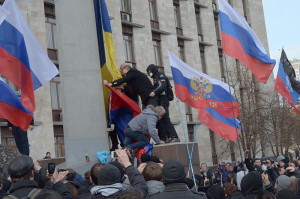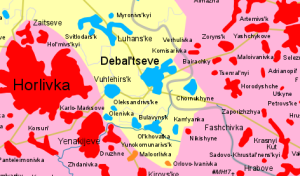Pro-Russian Rebels Take City of Debaltseve Despite Ceasefire
Pro-Russian rebel fighters took control of the town of Debaltseve last Thursday following the withdrawal of Ukrainian armed forces from the city.
The fighting in Debaltseve continued through the ceasefire agreed upon by Ukraine and Russia on February 15th in the Belarusian capital of Minsk, putting tension on an already precarious truce. The rebels have stated that Debaltseve is not included in the ceasefire agreement but is instead an “internal” matter.
 The ceasefire included a 12-point plan that included: a bilateral ceasefire, a decentralization of Ukrainian power that gives the rebel-affiliated regions more autonomy, monitoring of a 'buffer zone' on the Russia-Ukraine border by the Organization for Security and Cooperation in Europe, release of prisoners from both sides, withdrawal of Russian military groups considered to be illegal, and a program for economic reconstruction of eastern Ukraine.
The ceasefire included a 12-point plan that included: a bilateral ceasefire, a decentralization of Ukrainian power that gives the rebel-affiliated regions more autonomy, monitoring of a 'buffer zone' on the Russia-Ukraine border by the Organization for Security and Cooperation in Europe, release of prisoners from both sides, withdrawal of Russian military groups considered to be illegal, and a program for economic reconstruction of eastern Ukraine.
Debaltseve is a key city in the continuing Ukrainian conflict, as it is a strategic transport hub in the region that connects the rebel-held cities of Donetsk and Luhansk. The town was in rebel hands between April and July of last year, and armed rebels have had it surrounded for weeks, forcing between 2,000 and 8,000 Ukrainian troops to stay inside the city and exchange artillery fire with the rebel fighters.
The town held a population of about 25,000, of which most of the citizens have been evacuated. However, it is believed that around 7,000 civilians are still trapped inside the town by the fighting.
Ukrainian President Petro Poroshenko has said in a taped statement that the withdrawal of Ukrainian troops from Debaltseve was part of a plan. “Debaltseve was under our control, there was no encirclement, and our troops left the area in a planned and organized manner with all the heavy weaponry," Poroshenko said, according to his office. In conversations held between Poroshenko and European Union and American leaders, the president has asked for “a firm reaction from the world to Russia's brutal violation of the Minsk agreements," referring to the ceasefire agreement. NATO Secretary General Jens Stoltenberg urged Russia to withdraw its forces from eastern Ukraine.

Russian President Vladimir Putin has asked the Ukrainian government to allow its armed forces to surrender to rebels in the city, adding that fighting in the area was “understandable and predictable.” Conversely, President Poroshenko urged Russia to withdraw all forces from eastern Ukraine and to stop support of the separatists.
International organizations have had little effect on the escalating situation. The Organization for Security and Cooperation in Europe, which carries the task of monitoring the ceasefire and the intended withdrawal of heavy weapons in order to create a buffer zone, has not been able to enter Debaltseve apart from a half-hour visit on Saturday. The United Nations Security Council created a resolution calling on the relevant parties to abide by the truce.
The longer this conflict continues, the greater the ramifications for the West increase. According to CNN reporter Laura Smith-Spark, “the 10-month-long conflict in eastern Ukraine has hiked tensions with Russia to a level not seen since the end of the Cold War, affecting trade and raising the spectre of Russian expansion into Eastern Europe.” The longer the conflict ensues, the higher the consequences rise for the Russian economy vis-à-vis Western Europe. However, given President Putin’s continued vocal support for the separatist movement, it seems that the Russian government believes the advantages to be gained from expanding its influence into Eastern Europe are more profitable.
